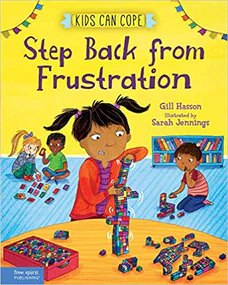Step Back from Frustration
Written by Gill Hassan
Illustrated by Sarah Jennings
32 pages
•
Published 2021 (Free Spirit Publishing)

Recommended Age Range: 1st grade through 4th grade.
Publisher's Summary:
When children can’t do something or can’t have something they want, they often feel frustrated. And feeling frustrated can make them feel wound up or angry, tense and hot, or helpless. They might get discouraged, and feel stuck, like it’s not worth trying anymore. Kids need effective strategies to work through their frustration…Children will learn how to look for a different way, ask for help, or let go of their frustration.

Dr. Annie's Takeaways
Recommended for: This is a good introduction to the feeling of frustration and how to manage it. It is applicable to children who blow up when they’re frustrated (e.g. kids who will smash apart a Lego creation if they’re struggling to get something right), as well as kids who are more inclined to quickly give up and avoid a frustrating situation.
Would a child like it? This isn’t a super fun book, but it’s informative and empowering, and it could be quite useful to a child who wants to better manage their frustration. The descriptions and skills are child-friendly and non-judgmental.
Evidence-Based Practices:
Psychoeducation, Emotional Literacy, Diaphragmatic Breathing, Emotion Regulation
Tone: Informative
Story Quality: This book describes the feeling of frustration and provides a handful of techniques for coping with it. It is written in child-friendly language that is compassionate and clear.
Illustrations: Friendly, colorful cartoons.
Representation: Many different children are represented in the illustrations (i.e., children with different skin colors, hair types, and genders). Stories of Alex (an Asian girl skateboarder), Joel (a White boy building a model rocket), Luis and his brother (Latino boys, one of whom wears a hearing aid, playing video games), Devi (a South Asian girl waiting at an amusement park with her (perhaps Sikh) dad who is wearing a turban), and Sami (a boy with light brown skin and brown hair who is struggling with his homework) are shared as examples of children coping with frustration.
Psychological Practices: This book reviews what frustration is, how it feels (e.g., “You may feel tense and hot. You might grit your teeth and clench your fists”), what it is telling us (e.g., “It might be time to try something a little bit differently”), why it’s useful to learn how to manage the feeling (“Maybe you get so wound up that you end up damaging the thing you were trying to make or do. Or do you bottle it all up but feel like you’re boiling inside?”), and how we can cope with it. The book teaches ten different strategies for managing frustration: taking slow deep breaths and imagining blowing out the frustration; squeezing a pillow; running in place; crying; taking a break with something easy or fun (e.g., drawing, kicking a ball); breaking a task down into smaller pieces; coming up with a different way to do something; finding something else to do (this specifically applies to the frustration of waiting); asking for help; and letting go when you can’t change something. It doesn’t go into great detail about any of these skills, but it’s a nice overview.
Concerns: On the very last page of the book when discussing the skill of letting go of frustration, it states, “when there’s nothing you can do to change a situation, there’s no point getting mad, sad, or upset. It won’t change things and it won’t make things better. Instead, you can do something else–something you enjoy!” It is reasonable to suggest that a child choose to do something else when they are frustrated and can’t change the situation, but the line about there being no point to getting mad, sad, or upset suggests that we have more control over these feelings than we actually do. I would have revised this to say something like, “when there’s nothing you can do to change a situation, it’s okay to feel mad or sad. If you choose to do something else–something you enjoy, it might help you to feel better more quickly!” It might be helpful to verbally make this change when talking with a child about letting go of frustration.
